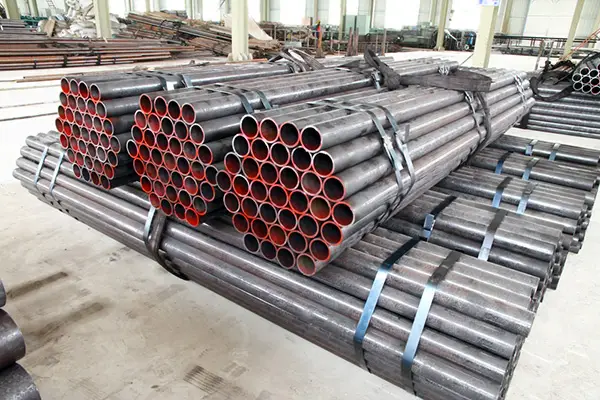

Seamless drilling steel pipe is a high-strength steel pipe used in geological exploration, oil and gas drilling, mining and other fields. Due to its seamless structure, it has higher strength, better pressure resistance and corrosion resistance, and is suitable for deep well drilling and harsh geological environments.
(1) Seamless structure
It is produced by hot rolling or cold drawing process, without welds, and has higher overall strength.
It avoids welding defects (such as pores, cracks, etc.) and improves the reliability of the pipe.
(2) High strength & wear resistance
It is made of high-quality alloy steel (such as 4140, 4130, AISI 4340, etc.) with high tensile strength and torsional strength.
The surface can be quenched + tempered (QT heat treatment) to improve hardness and wear resistance.
(3) Corrosion resistance
It can be galvanized, phosphated, plastic coated and other anti-corrosion treatments to extend its service life.
It is suitable for acidic environment (H₂S, CO₂) and seawater corrosion environment.
(4) Precision size
Outer diameter (OD): usually 60mm-200mm (customizable upon request)
Wall thickness (WT): 6mm-20mm, suitable for different drilling requirements
Length: 6m-12m (standard length), longer lengths can be customized
Application areas Specific uses
Oil & gas drilling Drill pipe, casing, tubing, drill collars
Geological exploration Core drilling, hydrological drilling, mineral exploration
Mining Blast holes, ventilation wells, drainage wells
Engineering survey Pile foundation construction, tunnel exploration
Scientific drilling Deep sea drilling, polar drilling
Hot-rolled seamless pipe (applicable to large diameter, thick wall pipe)
Round billet→heating→perforation→rolling→sizing→cooling→straightening→testing→finished product
Cold drawn seamless pipe (applicable to high precision, small diameter pipe)
Hot rolled billet→pickling→cold drawing→heat treatment→Straightening→Inspection→Finished product
Quenching + tempering (QT): Improve strength and toughness
Normalizing (N): Improve microstructure uniformity
Quenching and tempering: Optimize mechanical properties